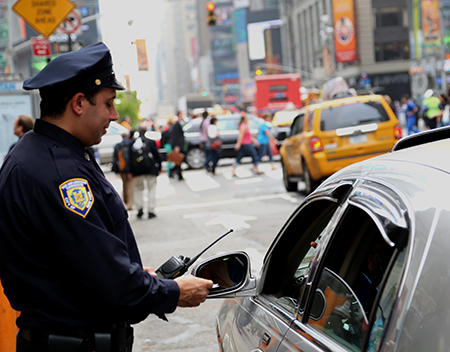‘If an uninvited kiss or unwanted touching doesn’t lead to a criminal complaint, even if the driver is terminated from the platform under which it occurred, the driver who violated a passenger may continue as a predator behind the wheel for another ridesharing company.’

TLC
The Assemblymember is calling for the creation of a centralized database of drivers who have been terminated by companies like Uber and Lyft.On Feb. 21, 2018 in Manhattan, a woman requested a ride to White Plains, New York using the Uber platform. After getting into the car that she requested, despite expecting a relatively short ride, she felt safe enough to fall quietly to sleep on the backseat. When she awoke, the woman quickly realized that she was in Connecticut and heading toward Boston, Massachusetts – hundreds of miles away from her intended and requested destination. After being cruelly abandoned on the side of an interstate highway in Connecticut by her driver, the woman was luckily able to find refuge at a nearby convenience store where she was able to seek help. These details are merely a fraction of the horrors that this brave passenger had to endure in Harbir Parmar’s car, according to federal court records. Parmar pled guilty to kidnapping and other charges and was ordered to serve a three-year prison sentence that began last summer.
That criminal attack is just one of more than 3,000 incidents in which passengers were attacked by Uber drivers in the United States, according to an 84-page report released by the company in December of 2019, which focused on customer interactions that took place during the rides Uber provided in 2018. The report concluded that 235 rapes occurred during such passenger rides. The same report also indicates that 2,810 incidents of non-consensual sexual contact occurred during that year. Surprisingly the company’s data also shows that nearly half of those incidents were initiated by passengers – not the drivers.
Uber is not unique in this regard and media reports indicate that similar encounters have taken place when passengers have been traveling with other rideshare companies such as Lyft. Uber also rightly points out that these incidents constitute an extremely small percentage of the total passenger interactions with drivers during the 1.3 billion rides the company’s affiliated drivers provided in the latest reporting year. The company also highlights the many steps Uber has taken to improve passenger safety and reduce the likelihood of a dangerous encounter. For example, Uber has: (1) tripled the number of its employees focused on protecting the safety of passengers and drivers; (2) added an In-App Emergency Button that customers can access; and (3) expanded their criminal background checks.
These are reassuring measures, but the safety of those using ridesharing networks for their transportation needs must still be strengthened and the companies that provide these vital services need to have the necessary tools to do it. As the Uber report tellingly advised, “We don’t believe corporate secrecy will keep anyone safe.”
Currently, ridesharing companies perform background checks on drivers that primarily rely upon their ability to gain access to information about potential criminal convictions – information that’s similar to what employers in many other industries routinely utilize. But this limits transportation giants such as Uber and Lyft to information that’s only available through a criminal background check, making it difficult for them to screen prospective drivers who may have engaged in misconduct that never resulted in a criminal conviction.
This loophole makes it possible for drivers to switch companies after an incident, such as a non-consensual sexual encounter, if the passenger never pursues a criminal case. If an uninvited kiss or unwanted touching doesn’t lead to a criminal complaint, even if the driver is terminated from the platform under which it occurred, the driver who violated a passenger may continue as a predator behind the wheel for another ridesharing company. This is even more alarming when we consider one survey that indicates that 76.6 percent of drivers are working for at least two or more ridesharing services.
Despite the rideshare industry’s best efforts, this glaring problem calls out for public policy leaders to take action to protect New York’s riders.
The much-needed creation of a centralized database of drivers who have been terminated by transportation network companies such as Uber and Lyft would provide companies throughout the industry with a reliable mechanism to utilize in screening prospective drivers and significantly reduce the possibility of drivers changing companies after being terminated for offenses. As a direct result, such a database would substantially increase customer safety for those utilizing the services of transportation network companies by preventing drivers from being able to prey on riders across several platforms after being banned from just one.
Such a database would enhance the effectiveness of the driver screening being performed by the industry and be a tremendous step forward for customer safety. As the Uber report states, “We encourage all organizations—airline, taxi, ridesharing, home-sharing, and hotel companies, as well as others—to share their safety records with their customers and exceed this report. People have the right to know.”
Assemblywoman Latoya Joyner represents the 77th Assembly District, which includes the Claremont, Concourse, Highbridge, Mount Eden and Morris Heights sections of The Bronx.









One thought on “Opinion: We Need a Database to Track For-Hire Vehicle Drivers Who Violate Safety Rules”
I agree. Drivers are also terminated for having an unsafe vehicle. What is to prevent a driver fired by one FHV company to go to another one? And not just Uber or Lyft but also any FHV black car, community car service, or a company with multiple vendors? I was recently in an illegal, dangerous FHV wheelchair accessible vehicle (WAV). I got out. The driver and vehicle were dismissed probably go go elsewhere.